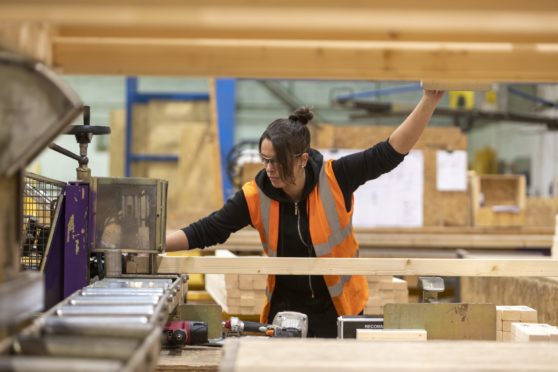Stewart Milne Group (SMG) has put its £100million timber frame business up for sale to focus on booming residential markets in Scotland and North West England.
The company said it was putting Stewart Milne Timber Systems (SMTS) up for a sale at a time when the market is “set to grow exponentially”, offering a “compelling investment proposition”. This will enable the group to prioritise on its core business of building homes instead.
SMTS has a £100m turnover and employs 400 people with around a 20% share of the UK market.
Alex Goodfellow, SMG managing director – strategic development, who is leading the sale process, said: “With the scale of the opportunity in the growing timber frame market, SMTS presents a highly compelling investment proposition.
We anticipate attracting a high level of interest from potential buyers who will invest in order to capitalise on that opportunity.”
Alex Goodfellow, Stewart Milne Group managing director
“We anticipate attracting a high level of interest from potential buyers who will invest in order to capitalise on that opportunity.”
SMTS “stellar” growth
The company said demand for timber frame has been rising rapidly and its use is anticipated to double in the next five years to meet government housing targets. Home construction using timber frames instead of brick is considered both more cost effective and sustainable as the UK seeks to build 300,000 new homes per year.
SMTS has experienced “stellar” growth in the last five years with a current order book of close to £300m, SMG said.
SMG has been investing in SMTS product and capacity at its factories in Aberdeen and Witney to keep up with the extremely strong demand.
Increased volumes have led to the creation of a third production facility in central Scotland.
Focus on housing market
Stuart MacGregor, SMG chief executive, added: “To keep pace with demand, it’s clear that further investment in production capacity in both Scotland and England will be required.
“As a privately run, independent company, we need to prioritise where we invest in the future.
“Since reopening last summer, after the initial Covid lockdown, we’ve seen record levels of activity in the UK housing sector.
The buoyancy of the current homes market post-Covid means land prices are increasing rapidly, Mr MacGregor said.
He added: “We have therefore chosen to divest our successful timber systems business and will focus on increasing investment in additional sites for Stewart Milne Homes.
“Using our considerable land buying experience to take advantage of the development opportunities, we will invest in land in the short term and concentrate on growing our homes business in the longer term” he added.
Covid impacted profits
In August SMG, based in Westhill, near Aberdeen, announced pre-tax losses of £71.5 million during the Covid-impacted year to October 31 2020.
Turnover of £269.7m effectively reflected fewer than eight months of “normal” trading, with operations halting for more than four months during the first pandemic lockdown. Ongoing coronavirus restrictions limited progress – and profits – during the rest of the year.
SMG’s full-year figures for 2019-20 follow a 16-month trading period as the group transitioned to a new financial calendar. Pre-tax profits and turnover for July 2018 to October 2019 came in at £48.5m and £379m respectively.
Operating profits for the latest period totalled nearly £800,000, compared with £7.2m in the previous 16 months.
SMTS reported turnover of £65m for 2019-20, down from a like-for-like 12 month comparison of £95m in 2019, as a direct result of the shut-down of sites and factories during lockdown.

